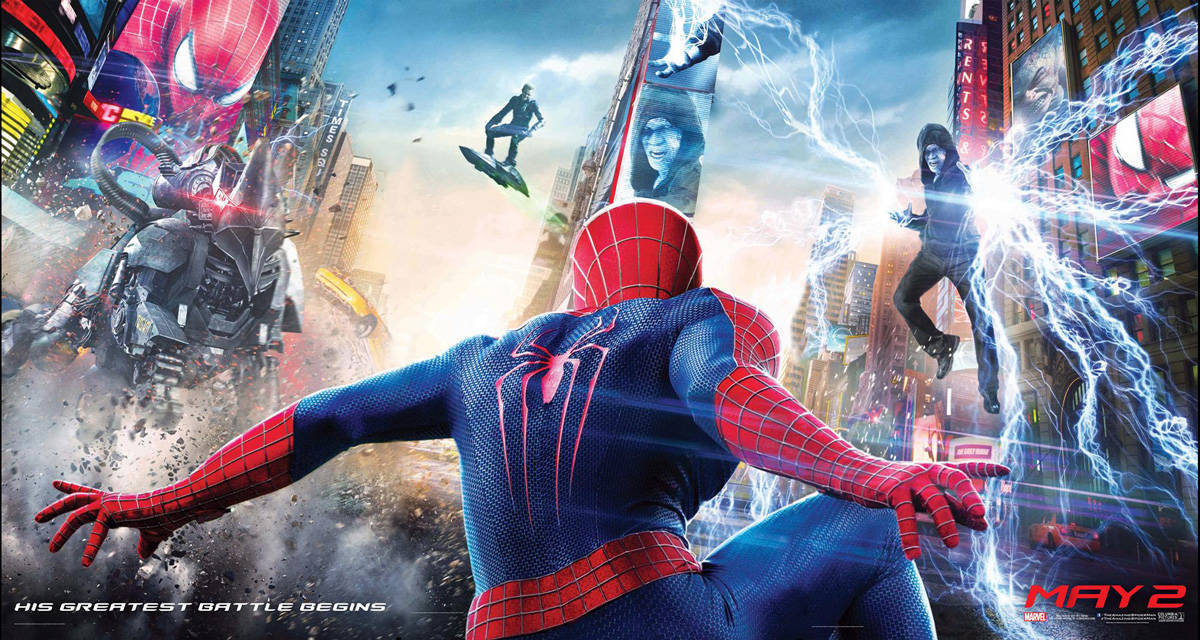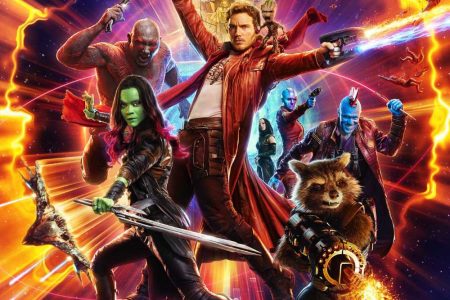The Amazing Spider-Man 2
After Kick-Ass 2 and Sin City: A Dame To Kill For, it’s time for the last in my little series of disappointing comic-book movie sequels. I cared so little for The Amazing Spider-Man, I didn’t see it in the cinema and didn’t bother to compile my thoughts on it in its own post – I included it in a collection of reviews of DVDs, and I didn’t even give it the prominence its alphabetical status warrants. Obviously, I wasn’t first in line to see the sequel, or even rushing to watching it when available to view at home.
Although I enjoyed Andrew Garfield as Peter Parker, and particularly his chemistry with the always fantastic Emma Stone as Gwen Stacy, I didn’t need any more Spider-Man films by Sony; however, because Marvel has proved that there is money to be made from superhero franchises, Sony was going to give us a sequel whether we liked it or not. And like it we did not.
The film suffers from money-grabbing instincts – it spends more time setting up sequels and spin-offs (does anyone really want a film about the Sinister Six? Really?) than it does concentrating on the job in hand – namely, making an entertainment film that would engender in people a desire to see more films about the lead character and implausibly minor characters from the small collection of supporting villains because that’s all Sony has to try to milk money out of comic-book fans.
The Amazing Spider-Man 2 is a classic case of completely missing the point of the success it’s trying to emulate: Marvel built up the films slowly, drip-feeding the future and sneaking in Easter eggs (well, except for the heavy-handed tactics in the less-than-stellar Iron Man 2); Sony forces it down your throat in one go – it’s like they hadn’t learnt the lesson of Spider-Man 3, stuffing it with too many villains and making a film nobody liked (even if it made money). It’s sad to see the great Paul Giamatti slumming it here in the hope of something more in a spin-off that is never going to happen. It’s a shame to see Chris Cooper spending his limited time in bed, waiting for future promises of more screen time that are now dust in the wind. Don’t get me started on the ridiculousness of the plotlines involving Richard and Mary Parker and the secret subway train nonsense. Having Electro develop the power levels the equivalent (and look) of Doctor Manhattan didn’t help matters, creating a truly bizarre finale in the electrical pylons. No wonder Sony had to face facts and work with Marvel from now on …
However, the worst crime in The Amazing Spider-Man 2 is believing that because it happened in the comic books, it had to happen in the film. Spoiler alert if you haven’t seen the film (although you wouldn’t be reading this if you hadn’t), but Gwen Stacy dies in the film, and the only reason is because it happened in the comic book. I can’t begin to describe the disappointment I felt that a group of white men in control of a genre that is dominated by white males thought it was perfectly natural to kill off one of the few great female supporting characters, just to make Peter Parker even sadder.
When Gwen appeared in the first film, I hoped that this would be part of the Marvel trend of not being completely beholden to comic-book lore – Iron Man’s identity is not a secret, Thor is not pretending to be a doctor with a limp, Ultron isn’t created by Ant-Man, Captain America isn’t a humourless dullard – and using the comic books as basis not blueprint. Gwen, as portrayed by Emma Stone, is smart, resourceful, funny, independent, principled, believable – everything that comic-book movies are lacking apart from Black Widow (Mary Jane in the first trilogy wishes she had half the gumption of Gwen). Stone’s onscreen chemistry with Garfield is great, and it looked like there might be a female character in a comic-book movie that could be an inspiration, a role model, a woman who was more than accessory to the male superhero … until she was killed off in an updating of the famous scene from the comic book.
It’s mind-boggling to witness the decisions of white men who have ignored the concept of Women In Refrigerators while retaining a sensibility from 1980s action films (that women exist only to be captured or be killed to motivate the male hero) and who completely believe that Gwen’s death MUST occur only because it happens in the comic book and adds a layer of tragedy to Peter Parker. A character who constantly carries with him the guilt of responsibility for his beloved uncle’s death, so he is clearly in desperate need of even more guilty and tragedy … This level of misery porn is one reason why I’ve never been a big fan of Spider-Man, and I naively hoped that it wouldn’t make the transition to a film made in the 21st century. I was wrong. We’ll see what Marvel can do to help, but I’m not holding my breath.
And that’s everything off my chest about those three films. I hope I don’t have to do this again, film studios.




